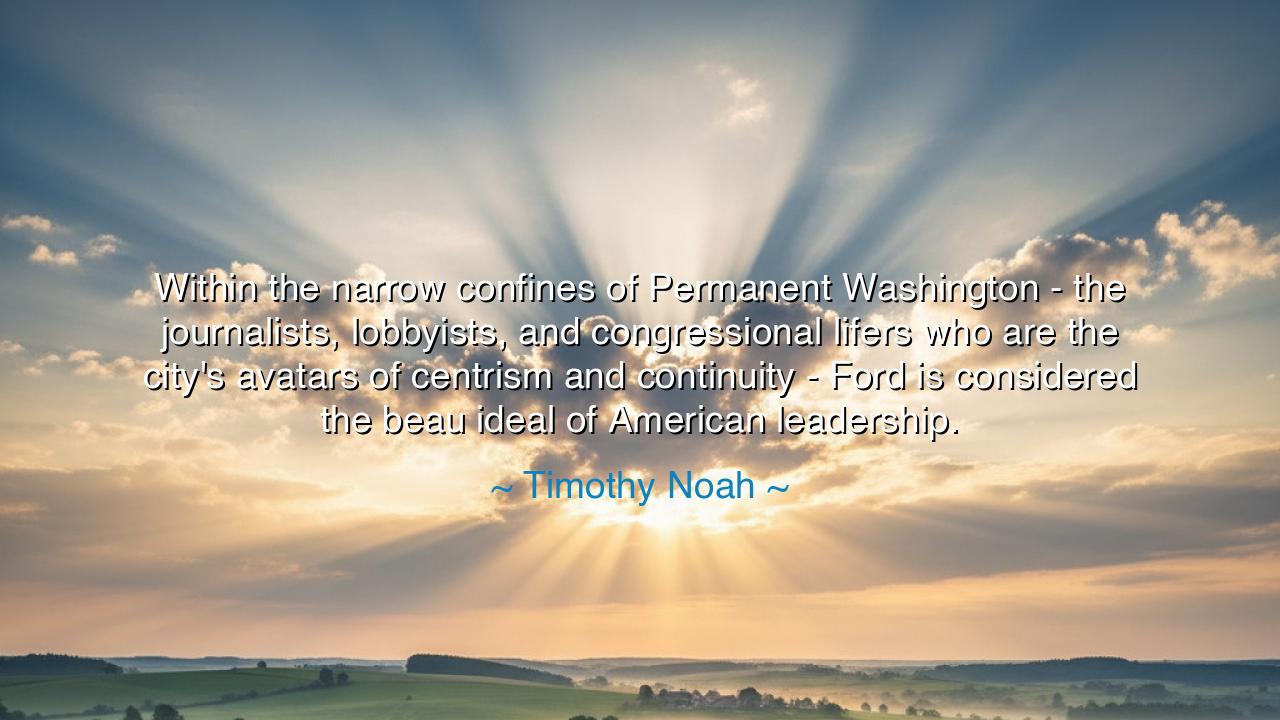
Within the narrow confines of Permanent Washington - the
Within the narrow confines of Permanent Washington - the journalists, lobbyists, and congressional lifers who are the city's avatars of centrism and continuity - Ford is considered the beau ideal of American leadership.






In the words of Timothy Noah: “Within the narrow confines of Permanent Washington—the journalists, lobbyists, and congressional lifers who are the city’s avatars of centrism and continuity—Ford is considered the beau ideal of American leadership.” These words speak not only of a man, but of an entire system, one that clings to stability above vision, to moderation above upheaval, to quiet endurance above fiery transformation. Here we are reminded that leadership is often judged not by the masses of the people, but by the guardians of tradition, who prize order as the highest good.
The ancients too knew this division. In Rome, there were men of fire, like the Gracchi brothers, who sought to remake society, and there were men of stone, like Cato the Elder, who clung fiercely to tradition and continuity. The Senate often celebrated the latter, for continuity gave them comfort, while fiery reform stirred unease. So it was with President Gerald Ford—remembered by those within the halls of power as a man who steadied the ship of state, not by remaking it, but by ensuring that it did not capsize. In times of turbulence, such leaders are revered by the keepers of order, for they embody the calm surface that conceals the storms beneath.
To understand this, we must recall the moment of Ford’s ascent. In the wake of the Watergate scandal, when the nation reeled from corruption and betrayal, it was Ford who assumed the presidency. He was not chosen by the people but elevated by the mechanisms of government. His mission was not to inspire revolution, but to preserve trust, to mend a fractured republic, to embody continuity when chaos threatened. For this reason, within the circles of Permanent Washington, he became the model—the “beau ideal”—of steady, measured leadership.
Yet history shows that such steadiness, while comforting, is not always sufficient. The Roman Empire, for centuries, prized continuity above reform, yet in time its failure to change led to collapse. In contrast, Abraham Lincoln, in the fires of civil war, dared not only to preserve the Union but to transform it, ending the curse of slavery. Continuity saved the form of the Republic; transformation saved its soul. Thus, while Ford embodied one kind of leadership, history reminds us that there are times when centrism must give way to courage, when continuity must yield to vision.
Noah’s words, then, are not only descriptive but cautionary. They reveal how power often celebrates the safe and familiar, even when deeper change is needed. To those within the “narrow confines,” the hero is the one who keeps the world as it is. But to those outside, hungering for justice or renewal, such leadership may seem timid, even barren. The measure of a leader, therefore, cannot be taken only by the esteem of insiders, but must be weighed against the needs of the people and the tides of history.
The lesson is clear: do not mistake continuity for greatness, nor centrism for justice. There are times when moderation is wisdom, when stability is the balm that heals. But there are also times when boldness is demanded, when a leader must risk comfort for truth, reputation for righteousness. The wise citizen must discern between the two, neither scorning the steady hand in times of crisis, nor idolizing it when the hour calls for transformation.
Therefore, O listener, remember this teaching: every age honors its own “beau ideal” of leadership, yet the true test lies beyond the judgment of insiders. Ask always—does this leader preserve only the shell of the nation, or do they nourish its soul? Do they guard merely the continuity of power, or do they awaken the conscience of the people? Only then will you know whether you stand before a caretaker of stability or a creator of destiny. And in your own life, when called to lead, be not only the guardian of what is, but also the herald of what must yet be.






AAdministratorAdministrator
Welcome, honored guests. Please leave a comment, we will respond soon